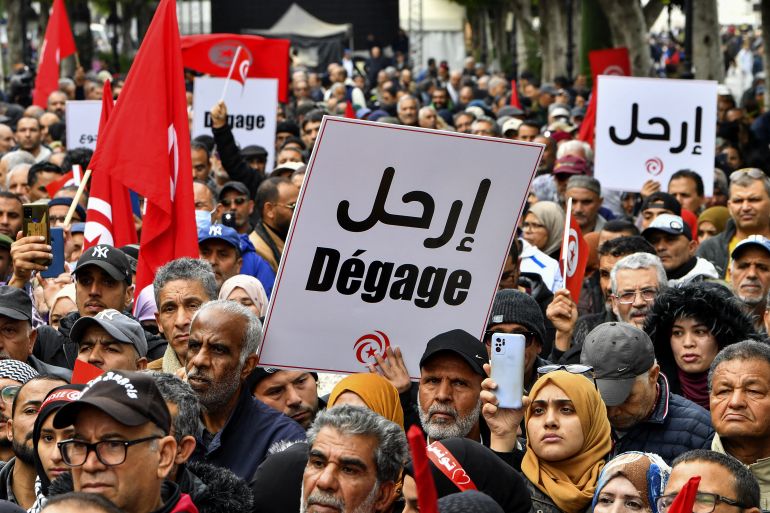Another uprising is in the making in Tunisia
President Saeid’s decision to turn to the IMF to save Tunisia’s economy will sound the death knell for his authoritarian regime.

In Tunisia, almost everyone agrees on one point: The economy is the country’s greatest vulnerability. Twelve years after its revolution, widespread economic dissatisfaction and blind adherence to counterproductive austerity measures dictated by the International Monetary Fund (IMF) are still the primary challenges to Tunisia’s prospects for building a resilient and progressive democracy.
Since the 2011 revolution, which was fuelled by economic discontent, none of the administrations that came to power managed to take concrete steps to address the country’s lingering economic woes. The resulting perpetual economic crisis eventually translated into a crisis in democracy and, as the recent Arab Opinion Index demonstrates, significantly weakened the Tunisian people’s faith in and support for the country’s young and fragile democratic institutions and processes.
The lack of improvement in the state of the economy led many Tunisians to the conclusion that no group within the political establishment is capable of enacting policies that would resolve the country’s deep-rooted economic struggles. This growing distrust in the ability of the established political classes to fix the economy was the main reason behind the Tunisian people’s embrace of populist, anti-establishment President Kais Saied as a potential saviour during the early stages of the COVID-19 pandemic.
In October 2019, Saeid was elected president on a promise to end corruption, strengthen the rule of law, hold the establishment to account for its mistakes and, perhaps most importantly, reform the economy.
When Saeid assumed absolute power in a coup two years later, Tunisia’s economy was on the brink of collapse – poverty and unemployment were rising, inflation was skyrocketing, corruption and clientelism were still pervasive and debts to predatory multinational institutions such as the IMF were ballooning.
Despite wielding unlimited power to instigate change, however, Saied took no meaningful action to fix the dire economic and social situation. Rather than attempting to find sustainable solutions to the country’s many deep-rooted problems, he attempted to crack down on all forms of opposition through a series of repressive and violent measures – his regime brutalised anti-government protesters, imposed travel bans on opposition politicians, and even tried to jail activists over critical social media posts.
On the economic front, his authoritarian regime failed to come up with an alternative to borrowing from the IMF to keep the country afloat. Repeating the mistakes of the Ben Ali era, Saied appears willing to do everything necessary to remain in the good books of the IMF.
After reaching a preliminary agreement with the IMF to secure a $1.9bn loan and finance the 2023 budget last year, Saied’s government is now gearing up to implement ravaging new austerity measures the financial institution presented as a prerequisite to sealing the deal. These policies will likely include the complete elimination of food and fuel subsidies, the slashing of public health, education, and social protection spending, and the privatisation of key public companies.
These policies will of course not be able to rescue Tunisia’s economy and end the suffering of its people. After all, even the IMF experts admit austerity policies often do more harm than good to the people subjected to them. They boost inequality and deepen poverty, make economic crises more frequent, increase unemployment and limit the prospects for economic growth, creating the perfect conditions for a social explosion.
There is, however, a silver lining to this grim state of affairs. The history of revolutionary progress in Tunisia is also a history of resistance to IMF interventions supported by dictatorial regimes.
The ongoing protests in Tunisia are similar to past demonstrations against austerity that have shaped Tunisian politics over the decades. The 1984 bread riot against the elimination of bread subsidies demanded by the IMF was an early sign of the political crisis that led to the 1987 coup d’état led by Zine El Abidine Ben Ali. Similarly, the 2008 Gafsa mining basin uprising that became one of the most impactful revolts in Tunisia’s history and inspired the 2011 popular uprising was caused by the Ben Ali regime’s alignment with the IMF’s infamous structural adjustment programme.
History suggests Saied’s decision to adopt austerity policies dictated by the IMF will sooner or later sound the death knell for his authoritarian and undemocratic regime. Despite abundant evidence, Saied appears oblivious to the warning signs of a looming social explosion – an explosion that will undoubtedly topple his dictatorship.
United against the failure of Saied’s regime to solve the nation’s economic problems and its compliance with the IMF’s dangerous demands, Tunisians will once again rise to try and save their democracy and ensure that they remain able to put food on their tables. Another Tunisian uprising is in the making.
The views expressed in this article are the author’s own and do not necessarily reflect Al Jazeera’s editorial stance.
